(Warning: this essay contains movie spoilers for both “Conclave” and “Judgment at Nuremberg”)
Growing into adulthood requires many things of us, and one of those things is that when debating politics or morality, we have a grownup’s obligation to engage with the opposition’s best arguments, rather than the arguments we wish they were making.
Once upon a time, dramatic movies made for adult audiences seemed to understand this rule of growing older and wiser. Filmmakers of the past often challenged their audiences with difficult morally complicated stories that could easily have been made simpler through pure black-and-white political demagoguery. Resisting the temptation to make the lazy demagogic argument, it seems to me, was an indication that Hollywood once trusted its audience in ways that its modern counterpart rarely seems willing to do anymore.
In the world of modern messaging where the most important thing seems to be that audiences come away from a film having learned the appropriate lesson, most movies these days do not leave it to their audience to appreciate nuance, and they certainly don’t trust their audience to make the correct moral judgment when presented with villains who, while they may be wrong or even evil, have a point.
What got me thinking about this was a recent weekend of movie watching which included my first viewing of “Conclave” (2024) juxtaposed with my annual re-watch of “Judgment at Nuremberg” (1961).
“Judgment at Nuremberg” is one of the finest films ever made. It is an “important” film in all the ways modern Hollywood aspires to but rarely achieves. It is dramatic and emotional, while also managing to be wildly entertaining. Set against the backdrop of the real life war crime trials of Nazi officials which were held in Nuremberg after the close of World War 2, the film is a fictional dramatization of what were called “The Jurists’ Trials”, in which senior Nazi judges (16 in all) were put on trial for crimes against humanity.
“Judgment at Nuremberg” echoes many of the same arguments made in the actual historical trials and the case turns on fictionalized versions of real world events. There are four defendants in the case, but the story focuses on the fate of a single defendant… a once-celebrated German jurist named Ernst Janning, played by Burt Lancaster.
A retired District Court judge from Maine named Dan Haywood (Spencer Tracy) is chosen to be the Chief Justice on a three-judge panel hearing the case against Janning and his co-defendants. Haywood is a good man and an excellent jurist with a stellar reputation who arrives in Germany with an open mind. He has not pre-judged the case he is set to hear, and is determined to give the men in the dock a fair hearing, even though the defendants are, as we might say here in 2025, “literally Nazis.”
And this is where things get interesting… because there is only one character in the film who wants to throw the book at the four accused judges. Richard Widmark plays Prosecutor Tad Lawson, an Army Colonel who fought his way through some of the most brutal fighting on the road to Berlin, only to find himself immersed in the horror of liberating the Concentration Camps. Lawson wants justice, not only for the unspeakable crimes he witnessed in Dachau and the other charnel houses of Eastern Germany and Poland, but also for what he was forced to do, and what was done to him, on the battlefield. Lawson is relentless in his prosecution of the four Justices, his fury always there just below the surface, threatening to boil over at any moment and consume him.
But ultimately Lawson is alone in his crusade. Every other character in the film, and I mean every one, argues that the men in the dock, while certainly guilty of crimes, deserve grace, understanding, leniency, and even clemency at the hands of Haywood and the American-led tribunal. Even Lawson’s superior officers urge him to go easy on the defendants, knowing that the Cold War is already heating up and that the United States will need the German people on its side in the coming conflict with Russia.
The emotional opposition to Lawson’s prosecutorial zeal comes in the form of Frau Bertholz, the widow of a high ranking German Wehrmacht officer who was executed after being found guilty in a previous session of the Nuremberg Trials. Frau Bertholz lost not just her beloved husband, but also her family fortune and her place in German high society. Nevertheless, Bertholz remains stoically Teutonic even though her fresh grief is always with her, still raw on her face. The character is lent extra heft by the performance of Marlene Dietrich, a native German who in real life helped smuggle Jews out of Germany before the war, renounced her German citizenship in 1939 and used her star power in America to sell more war bonds than any other movie star.
Frau Bertholz befriends Haywood early on in the story and is very frank with him that her goal is to convince him that not all Germans are monsters. She introduces Haywood to what’s left of German culture, art and music. She also takes him to bars to listen as Germans sing beautiful songs about the tragedy of war, love and loss… scenes which highlight the humanity of the average German, for whom the rise of the Nazi Party was also a tragedy. There is even a hint of a burgeoning romance between Haywood and Bertholz, the widower and the widow. But the case hangs heavy over the two of them and as the story develops, there is a sinking feeling that whatever may be happening between them will not survive the outcome of the trial.
Bertholz’s personal red line is the defense of her fellow countrymen… if she could not save her husband, perhaps she can save her country’s reputation. She wants Haywood to understand that there is no unique flaw in the German character which allowed Hitler to rise... that her husband hated Hitler and the Nazis, but like most Germans he felt powerless to stop them, and chose to follow his orders as an officer loyal to his country (a plea that will later be echoed by Janning).
Bertholz believes that in his zeal to prosecute every German official he can get his hands on, Colonel Lawson’s efforts are beginning to look less like justice and more like vengeance. That to blame the whole of the German people for the crimes of the Nazis is unreasonable, and that anyone who seeks to punish anyone who had a hand in Hitler’s abuse of power, no matter how insignificant, will eventually have to face some very uncomfortable realities about his own guilt… a point Janning’s defense attorney Herr Rolfe will make again later on in the trial during a speech which probably single-handedly won Maximillian Schell an Oscar.
Now, I happen to disagree with this argument, and I side with Lawson over Bertholz and Rolfe, but the point is that the movie doesn’t prejudge the case for its audience. It trusts us to be adults… to hear both arguments and then choose for ourselves which argument is on the side of virtue.
And while we are on the subject of Janning’s defense attorney Herr Rolfe… it must be said that defending the life and crimes of a senior Jurist in the Nazi regime would have been a difficult and thankless job, but it is one which Herr Rolfe accepted because as a young aspiring lawyer he was a great admirer of Janning and wishes the world to see the man he looked up to, rather than the accused war criminal in the dock. Despite having the unenviable task of defending a Nazi, Rolfe is never portrayed as a mustache-twirling villain. On the contrary, his arguments in defense of Janning are given a fair hearing by the filmmakers. In a speech in which Haywood delivers his final verdict, he describes Rolfe’s defense of Janning as “skillful” and twice tells the courtroom that “there is truth” in the arguments Rolfe makes in defense of his client.
The crux of Rolfe’s defense is that Janning is a decent man, an exemplary jurist and that while he too hated Hitler and the Nazis, as a patriotic German who loved his country, Janning (like Frau Bertholz’s husband) believed it was his duty to stay at his post and act as a counterweight to the worst of the Nazis’ impulses. Rolfe argues that there was no way for Janning to know, nor could he have imagined, that the end result would be an entire generation of European men lost to the abattoir of war, concentration camps, and six million murdered Jews.
This strikes me as an argument that stands on very shaky moral ground, but that does not mean the argument is beyond the pale nor does it mean that Rolfe shouldn’t be allowed to make it. We have an obligation to engage with our opponent’s best arguments, and the truth is that none of us knows how we would react if we found ourselves in a situation like the one Janning and his fellow Jurists found themselves in pre-war Germany. It is very easy to triumphantly post the “be this guy” meme featuring a photograph of one man standing with his arms crossed over his chest in a sea of what Dr. Henry Jones Sr. would have called “goosh schtepping morons”… it is quite another thing to actually be that guy. We all like to think that we would, but the sad fact remains that the photograph proves when the rubber met the road, only one man in that enormous crowd actually was “that guy.”
Judge Haywood gets to the heart of this thorny moral quandary during his stirring final speech, when he says:
Janning's record and his fate illuminate the most shattering truth that has emerged from this trial. If he and the other defendants were all depraved perverts - if the leaders of the Third Reich were sadistic monsters and maniacs - these events would have no more moral significance than an earthquake or other natural catastrophes. But this trial has shown that under the stress of a national crisis, men - even able and extraordinary men - can delude themselves into the commission of crimes and atrocities so vast and heinous as to stagger the imagination.
What Haywood is saying here is that while it may be true that defying the Nazis would have put Janning in mortal danger, this is not a defense of his crimes, and that staying at his post in hopes of turning a colossal evil into a slightly smaller one cannot provide him with absolution.
The movie ends with Haywood making the morally just decision, though one which is very difficult for him personally and also unpopular, even amongst his legal staff and his fellow Judges. But Haywood’s decision is arrived at honestly… it is earned, as we say in Hollywood… earned through something as fundamental as letting the opposition have its say in a free and open debate… a fair trial, one might say.
But in one final nod to the ugly complexities of the real world, an on-screen pre-credits scroll informs the audience that in the case of a final gentleman’s wager Rolfe proposes to Haywood, the details of which I will not reveal here, Rolfe would have come out the winner.
Thus the final message of the film is that the real world is not always as we wish it would be.
Now, let’s compare the approach “Judgment at Nuremberg” takes to some of the thorniest moral issues ever faced by modern human beings to the approach taken by the 2024 movie “Conclave” concerning subject matter which is much less fraught than Nazis and the Holocaust… the moral and political direction of the Catholic Church.
“Conclave” is a well made movie, lush, beautifully shot and well-acted. It’s also a detailed look into a fascinating and mysterious world that most people, myself included, know almost nothing about. But in the end, as with much of Hollywood’s output these days, it is a movie which does not trust its audience and spoon-feeds its moral lessons in order to make sure we learn the correct ones.
The story begins with the death of the Pope and sees the College of Cardinals quickly sequestered in the Vatican where they will choose the next Pope via a complex process known as “Conclave.” Conclave is a political contest as much as it is a spiritual one and the battle lines are quickly drawn between those Cardinals who seek a more Progressive Catholic Church and those Conservative traditionalists who want the Church to return to its biblical roots after the reign of a more Progressive, and permissive Pope.
Progressives versus Conservatives… you’ll never guess what happens next!
It quickly becomes clear that the sympathies of the filmmakers lie with the Progressives in this story. Throughout the film, the Progressive cause is championed by three decent and honorable men, our heroes, who try to do the right thing at every turn... which is to say they fight with every tool at their disposal to ensure that the most Progressive candidate is installed on the Papal throne.
The problem is that at no point do any of these characters, heroic though they may be, make the case for why a more Progressive Church would be an objectively good thing… as with “Diversity” or “The Science” a Progressive Papacy is simply assumed by the filmmakers to occupy the moral high ground.
Fortunately for our heroes, they don’t need to make an argument, because there is no one at home on the other side. Rather, the Conservatives are represented in the story by Cardinal Tedesco, as two-dimensional a garden variety bigot as I have seen in a prestige film of this kind. Tedesco rails against Muslims, suggests that black Africans are unworthy of the Papacy and makes it clear that if he were to be named Pope, he would ensure that women are kept out of the Priesthood and Homosexuals are thrown in prison.
In this way, the filmmakers not only telegraph very early in the story how we are supposed to feel about the characters in the movie, but also how we should expect the story to end. This is all fine, of course, filmmakers are free to make whatever point they want in any way they desire. The problem is that while it might be a lot of fun to watch the Globetrotters beat up on the Washington Generals, it doesn’t make for good drama… you have a pretty good idea how things are going to turn out.
Unlike “Judgment at Nuremberg”, there is never a need to debate in “Conclave” who are the good guys and who are the bad… who is right and who is wrong. There is no moral question, nor even is there any ambiguity. The filmmakers have spelled it out for you at every turn, as if in a paint-by-numbers book. This alleged “thriller” is set not on a mountain road full of twists and turns, but on a pair of railroad tracks that go in only one direction.
Now, I am not particularly religious, nor am I a Catholic, but this is lazy storytelling and it offends my sense of fair play. If “Judgment at Nuremberg” can give a fair hearing and a space for honorable men and women to argue for grace, leniency or even forgiveness for actual Nazis, then surely “Conclave” could have given the same to those who seek a more conservative interpretation of the Bible.
But of course, in the era of “everything I don’t like is fascism”, the Overton window has shifted tectonically, and the space for men and women of good faith to make arguments which are at odds with Progressive Orthodoxy in our mass media spaces cannot be allowed.
The filmmakers who made “Conclave” put a thumb on the scale in a way that the filmmakers behind “Judgment at Nuremberg” did not. This, I believe, is the fundamental reason why “Judgment at Nuremberg” remains a celebrated classic sixty-five years after its release.
Sixty-five years from now, will audiences speak about “Conclave” in the same way? I have my doubts.
If you enjoyed this essay and would like to support the work we do here at The Continental Congress, please consider becoming a paid subscriber or buy me a coffee. And don’t forget to join me in the chat every Friday night at 7pm Pacific time for a Hollywood Q&A. Thank you, so much, for your time and your patronage!

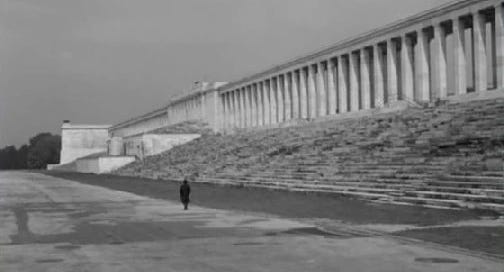


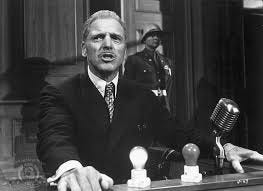

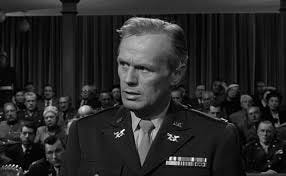
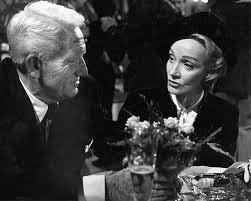
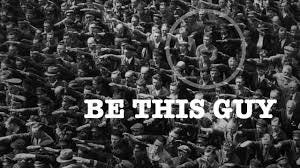
Interesting and well-written. I have a friend who uses "Judgment At Nuremberg" in her modern Europe classes to illustrate many of the very points you have made here.
I do have a personal observation to make though. I am an American born in 1959 so obviously I have no personal experience of these things. However I have a large extended family in Belgium with whom I grew up in the 1960s and 1970s. As you might surmise the parental generation experienced the War and the Occupation for five long years, before the Liberation. And of course, at the time, no one could predict whether the Occupation would last for five years, fifty years or five hundred years.
So people went to their jobs, because they had families. There were seven brothers and sisters in the parental generation, and they had to eat, which meant that the grandfather--a retired Belgian infantry officer who had commanded an infantry regiment in WW1--had to work, and--inexorably--do business with the Occupier.
So my question is, where do you draw the line? To be clear, I think that a senior leader like a judge owes more than, e.g. a shopkeeper. But...we have seen how this goes in the former socialist-bloc countries of central Europe, which were, in fact, under Soviet occupation for nearly fifty years. After the fall of the Wall, a reckoning came due, and the question became, how do you deal with an entire nation who collaborated with a murderous regime, albeit under force majeure?
In central Europe, many of the countries involved eschewed a judicial process in favor of some variant of "Truth and Reconciliation." Notably, in many cases there were public releases of personal dossiers that were made publicly available. This allowed each person to judge those they knew and be judged by them in turn.
In her book "The Haunted Lands," Tina Rosenberg meditates on the difference between these countries and places in which the legitimate government has been overthrown, and concludes that it is far harder to make out a case against people who comply in the former than the latter. "I was only following orders" may seem like a nonsensical defense to us, but...we've never been occupied by a foreign power.
Or at least, not since we threw the British out in the late 1700s. One can only imagine how the leaders of the Revolution would have been treated had the British won the Revolutionary War.
My larger point being, you are correct in what you say about Judgment At Nuremberg. But you should bear in mind that even its seemingly fair treatment and mature invitation to the audience to make up its own mind is heavily weighted by the planted axioms embedded by the filmmakers.
I think a major problem that hasn’t been addressed is that we used to treat adults like adults and children like they are smart enough to understand complex concepts. Today we treat adults like children who need everything spelled out and kids like drooling morons who can’t comprehend even the most basic ideas.